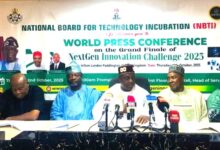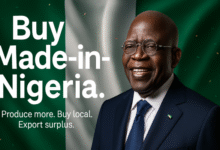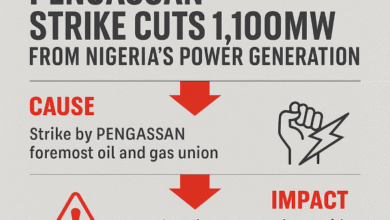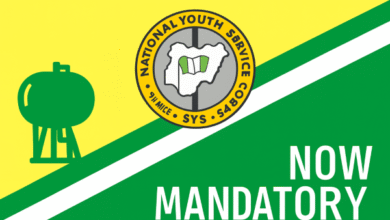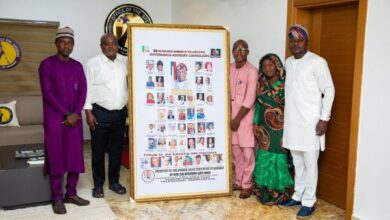National Conference To Start February 10
 The much vaunted national conference is expected to finally begin on Monday, February 10, 2014 after a harmonisation committee would have finished harmonising the modalities for the confab.
The much vaunted national conference is expected to finally begin on Monday, February 10, 2014 after a harmonisation committee would have finished harmonising the modalities for the confab.
According to sources within the Presidency, members of the committee may include Secretary to the Government of the Federation, SGF, Senator Anyim Pius Anyim; some members of the Presidential Committee on National Dialogue, which last week submitted a 4000-page report to President Goodluck Jonathan; and Minister of Finance, Dr Ngozi Okonjo-Iweala are expected to meet with the members of the Dr Okurounmu confab committee to harmonise the modalities.
“Thereafter, they will meet with the Finance Minister to work out how the conference will be funded. All these will take about one month so that the conference will begin in the second week or middle of February, next year.”
In different reactions to the news, eminent Nigerians have aired their views as regards preparations for the confab. Former Nigeria Bar Association National President, Dr. Olisa Agbakoba (SAN), said, “History has not produced this type of moment in a long time. Therefore, we must take it very seriously.”
“I thought the people who should be invited should be the ethnic nationalities; they make up Nigeria. And that it should not be a talk shop.
“We should have six geo-political mini conferences. So that as an Onitsha man, the challenge of an Onitsha man being governor of Anambra State is localised in the South-East and that is where we will discuss it.
“But the challenge of South-East having equal states with the other zones is a matter for the national conference.
“So the mini-conference gives opportunity for the ethnic nationalities in the zone to shape out their problems, pre-sent their report and nominate 15 people to move forward.
“The other zones will also nominate 15 people each. At the national conference level, the representation should be equal. If the Presidency wishes to nominate 120 representatives, nothing is wrong with it. He is the executive President, he has a view.
“There is nothing wrong with the National Assembly sending their representatives because you cannot exclude anybody.
The important thing is that the discussion should not be altered. If it says we should return to parliamentary system or Westminster model so be it.
“If it says let’s retain the presidential system or go for single tenure, which Senator Ike Ekweremadu irrelevantly brought in, so be it.
“Even though he has a point, Ekweremadu brought it in wrongly. Every system has its political value. The way Ekweremadu’s point sounds, it is as if there is going to be mago mago or as if the National Assembly will receive the constitution and put a clause in it.
“I wish he had not said that because I actually believe in that. Nigeria is in political evolution and one of the problems is succession. If that is the problem and we spend billions and trillions of naira then let people go for one term.
“I wish Ekweremadu had kept his powder dry and allowed it to be a common agreement. I hope that all these issues will be discussed at the conference.
“Nigeria is not in the best of shape. We need politicians who have statesmanlike qualities of Mandela because Nigeria is a great country with huge natural resources.
“The national conference should be on how to make Nigeria work. In doing this, Chief Bola Ige’s two questions must be answered. Do we want to stay together? How do we want to stay together?”
Also airing his views, Second Republic politician, Chief Guy Ikokwu, lent his support to the proposed conference, which he hoped will help address the country’s numerous developmental challenges.
On the issue of revenue expenditure, for instance, he said: “It is necessary that there should be constitutional provision for all the tiers of government not to exceed 40% of their budget of recurrent expenditure, while reserving the balance of 60% for capital expenditure.
“The implementation of this quota will lead to the greater development of the country.
“Abuja should not exercise more than 30 per cent of its present powers, while the six zones, which should become the federating units, will have more regional powers than the states have at the moment.
“Each of the zones can create as many states as it requires without the need for another tier of local government structure so that the states will assume the powers of the former local government thus reducing administration cost.
“With this zonal structure there will be more discipline and bigger political parties thus reducing the incidents of corruption, which is presently plaguing the whole country.
“It will, therefore, be necessary to increase the private participation in developmental works so that the government agencies will cease to become the controllers of the work force and jobs, which will now go to SMEs or other big private organisations as we have in the United States, Germany, India and even China.
“There should be constitutional stipulations for those who loot the economy or embezzle funds, as we have seen in the pension scam or the oil and gas sector, to be punishable by death or long periods of imprisonment with reparation without any option of fine.
“In this a way corruption will certainly reduce to a great extent with high quality education, civility and morality will certainly increase.”
He suggested that the conference should be funded through the budgetary provisions of a supplementary bill enabling the zones to be financially accommodated on an equal basis and the conference should be able to complete its work within nine months in 2014.
On modalities for decisions, he suggested decisions at the conference should be by consensus and negotiations or, in some cases, as shall be decided at the opening of the conference by a vast majority of at least two-third of the delegates to break any dead lock that might hinder the conference.
To legalise the outcome of the exercise, Ikokwu canvassed said: “The President shall use the National Assembly machinery for the formalisation of the conference and for a referendum with regard to the eventual decisions of the conference.
“The National Assembly should not amend or veto any conference decisions and shall, at the end of the referendum, promulgate a new national constitution in such a way that had been done before, at independence or at the 1963 Republican Constitution.”


